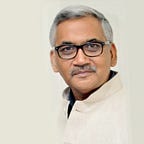The Journey of Truth
Superior beings do not require the help of any external physical entity to create their own identity. My Guru Acharya Mahapragya never saw himself as representing a sect, belonging to a community or being part of a time frame. Introspections brought him face to face with different insights about who he was or could be. In one such moment he introduced himself thus: “My soul is my God; renunciation my prayer; amity my dedication; self restraint my power; non violence my religion.
This removes him from the limits of the Mind, to the infinity of Consciousness and spirituality. His famous book, Appanam Saranam Gacchami, guides us across the realm of no authority – to no one, but our own soul. He said, “What we call religion is an attempt to reach out to our own pure consciousness.” His overarching concern with the state of present-day mankind was expressed on many an occasion. He had a very precise agenda… to turn this country into a great nation. He believed that it was possible through “Roti, Shanti, Charitra” in sharp contrast to the oft-repeated “Roti, Kapda, Makaan” (a mantra for economic upliftment made popular by a movie by that name).
After a span of 2600 years, the life ,Acharya Mahapragya, is a sublime tribute to Lord Mahavir himself. In a conference he stressed “Jainism and all other religions stress on the importance of non violence, non acquisitiveness and friendship, but this world has never been more distant from these values than it has ever been before.” He delved deep into this dilemma to find the reason why the unwavering, deep traditions propagated by organised religions for hundreds of years, were being discarded, with scant impact on lifestyles and behaviour. “We are not practicing what we are preaching”, he observed. (What, in today’s terminology would be not to ‘walk the talk’.)
From his spiritual experience, Acharya Mahapragya discovered that at the root of everything – behind all disorders – is the state of our consciousness. That is where it all starts and that is where we should begin to address the problem. Humanity is confronted with a choice – intellectual education on the one hand, and religious instruction on the other. This choice is illusory and impractical, for neither of the choices by itself can bring about any change without a desired change in consciousness.
In a way, Acharya Mahapragya could be termed a rational spiritualist. “It is my firm conviction”, he once said “that even religion that is not scientifically validated, cannot truly guide us.” His guru and mentor, Ganadhipati Tulsi, proclaimed him to be “one of (my) greatest achievements in life”. Such was his spiritual erudition!
It is noteworthy to mention here how former President of India, Dr APJ Abdul Kalam’s fellowship with Acharya Mahapragya – a saint, yogi, spiritual leader, philosopher, author, orator, and poet – bears similarities with an earlier one between Jain muni , Shrimad Rajchandra – who too was a poet, mystic, philosopher, scholar and reformer – and Mahatma Gandhi, whose spiritual guide he was.
Acharya Mahapragya was so deeply convinced about the essence of meditation and its need that in his book, Yatra ek akinchan ki, , he hoped that if at all his birthday was ever remembered in the future it should be commemorated as “Dhyan Diwas”. He was unequivocal in his summation that knowledge enriches us about the outer world, but only meditation can enrich us about the inner; and without the latter, the former is meaningless.
Acharya Mahapragya was neither a person nor a philosophy nor a dogma. He was an institution in its own right. His expansive journey, from the little boy, Nathu, to the young Nathmal, to Mahapragya, to Yuvacharya Mahapragya…and thence, to Acharya Mahapragya, was not a journey of the external kind, but one that was intensely of the soul – the inner domain. He was anxious about the fact that the impact of religion on daily life was fading away due to its practice being devoid of principles. Thus, his gift of Preksha meditation to us comes at a momentous time.
When we think of Lord Krishna we think of the Bhagavad Gita; when we think of Patanjali we remember Ashtang Yog; when we think of Christianity we are reminded of the Ten Commandments and when we think of Lord Buddha we recall his Four Ways Path. Today, centuries later, I believe, when we think of Acharya Mahapragya we will recall the Eight Steps to Preksha meditation, which he gave to mankind – based on the three sutras and five prerequisites (upsampadas)
